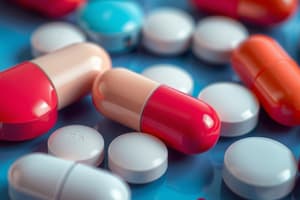Podcast
Questions and Answers
What is the primary focus of medicinal chemistry within pharmaceutical chemistry?
What is the primary focus of medicinal chemistry within pharmaceutical chemistry?
Medicinal chemistry focuses on studying the chemical properties and biological effects of drug compounds.
Explain the importance of pharmacokinetics in drug development.
Explain the importance of pharmacokinetics in drug development.
Pharmacokinetics is essential as it studies drug absorption, distribution, metabolism, and excretion (ADME), which determines the drug's effectiveness and safety.
Describe the term 'Structure-Activity Relationship (SAR)' and its significance.
Describe the term 'Structure-Activity Relationship (SAR)' and its significance.
Structure-Activity Relationship (SAR) refers to the correlation between the chemical structure of a compound and its biological activity, which is significant for drug design.
What is the relationship between pharmacodynamics and clinical pharmacology?
What is the relationship between pharmacodynamics and clinical pharmacology?
Identify one role that pharmacy graduates can pursue in regulatory agencies.
Identify one role that pharmacy graduates can pursue in regulatory agencies.
Flashcards are hidden until you start studying
Study Notes
B.Pharmacy Overview
- Bachelor of Pharmacy (B.Pharmacy) is an undergraduate degree focused on the study of pharmaceutical sciences.
- Prepares students for various roles in the healthcare and pharmaceutical industries.
Pharmaceutical Chemistry
- Involves the design, synthesis, and development of pharmaceutical compounds.
- Key Concepts:
- Medicinal Chemistry: Study of chemical properties and biological effects of drug compounds.
- Analytical Chemistry: Techniques for analyzing drug composition and quality (e.g., chromatography, spectroscopy).
- Pharmaceutical Formulation: Development of drug formulations (tablets, injections, etc.) ensuring stability and bioavailability.
- Drug Metabolism: Understanding how drugs are processed in the body, including phases of metabolism.
- Structure-Activity Relationship (SAR): Correlation between chemical structure and biological activity.
Pharmacology
- Science of drugs and their effects on biological systems.
- Key Concepts:
- Pharmacodynamics: Study of drug effects and mechanisms of action on the body (e.g., receptor interactions).
- Pharmacokinetics: Study of drug absorption, distribution, metabolism, and excretion (ADME).
- Dosage Forms: Different forms of medication (e.g., oral, topical, injectable) and their implications for therapeutic use.
- Toxicology: Study of harmful effects of drugs and chemicals, understanding dose-response relationships.
- Clinical Pharmacology: Application of pharmacological principles in clinical settings to optimize drug therapy.
Career Opportunities
- Graduates can work in:
- Pharmaceutical companies (research and development)
- Hospitals and clinics (pharmacy practice)
- Regulatory agencies (drug approval and safety)
- Academia (teaching and research)
B.Pharmacy Overview
- Bachelor of Pharmacy (B.Pharmacy) is an undergraduate program centered on pharmaceutical sciences.
- Equips students for careers within healthcare and pharmaceutical sectors.
Pharmaceutical Chemistry
- Focuses on creating, synthesizing, and refining pharmaceutical compounds.
- Medicinal Chemistry: Examines chemical structure and biological impacts of drugs.
- Analytical Chemistry: Employs methods like chromatography and spectroscopy to test drug composition and ensure quality control.
- Pharmaceutical Formulation: Innovates and develops drug forms (e.g., tablets, injections) ensuring they are stable and effective.
- Drug Metabolism: Studies the body's processing of drugs, including metabolic phases.
- Structure-Activity Relationship (SAR): Investigates the link between a drug's chemical structure and its biological effects.
Pharmacology
- Explores drugs' effects and interactions within biological systems.
- Pharmacodynamics: Focuses on drug effects and mechanisms, particularly receptor interactions.
- Pharmacokinetics: Analyzes how drugs are absorbed, distributed, metabolized, and excreted (ADME).
- Dosage Forms: Covers various medication forms (oral, topical, injectable) and their therapeutic implications.
- Toxicology: Studies adverse drug effects and dose-response relationships.
- Clinical Pharmacology: Implements pharmacological principles in clinical environments to enhance drug therapy outcomes.
Career Opportunities
- B.Pharmacy graduates can pursue roles in:
- Pharmaceutical companies focusing on research and development.
- Hospitals and clinics in pharmacy practice.
- Regulatory bodies managing drug approval and safety.
- Academia, involved in teaching and conducting research.
Studying That Suits You
Use AI to generate personalized quizzes and flashcards to suit your learning preferences.




